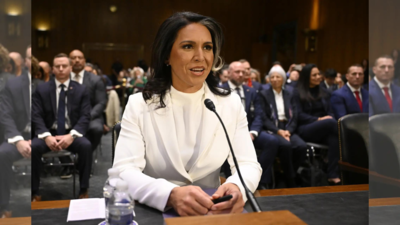During her confirmation hearing for the position of Director of National Intelligence (DNI) on Thursday, Tulsi Gabbard, President Donald Trump’s nominee for the post, faced intense scrutiny over various aspects of her political views and past actions.
The discussion became particularly contentious when it turned to her religious beliefs and her connection to the Science of Identity Foundation (SIF), a Hindu religious group.
In a pointed remark, Gabbard addressed questions about her faith, specifically defending the principle of religious freedom enshrined in the US Constitution.
“Unfortunately, there are some Democrat senators who still don’t understand the principle of freedom of religion and Article 6 of the Constitution,” she said, referring to the clause that states, “no religious test shall ever be required as a qualification to any office or public trust under the United States.”
Gabbard went on to accuse certain senators of fostering religious bigotry, claiming they were targeting her Hindu faith. “They’re once again using the religious bigotry card, but this time trying to foment religious bigotry against Hindus and Hinduism,” she added.
Gabbard also invited those interested in her spiritual path to learn more about her beliefs on her X account. “If anyone is sincerely interested in knowing more about my own personal spiritual path of Hinduism, I welcome you to go to my account on X where I’ll share more on this topic.”
The hearing, which lasted more than two hours, saw Gabbard grilled by senators on her past statements and actions. One of the key points of contention was her 2017 meeting with Syrian leader Bashar Assad, as well as her comments regarding Russia’s invasion of Ukraine.
She faced fierce criticism for some remarks that were seen as sympathetic to Russia’s stance, leading to concerns about her foreign policy judgment.
Additionally, Gabbard’s previous support for Edward Snowden, the NSA leaker, was scrutinized, with senators questioning whether her views on surveillance posed a risk to national security.
Despite the challenges, Gabbard defended her positions, arguing that her policy stances were often misinterpreted or taken out of context.







